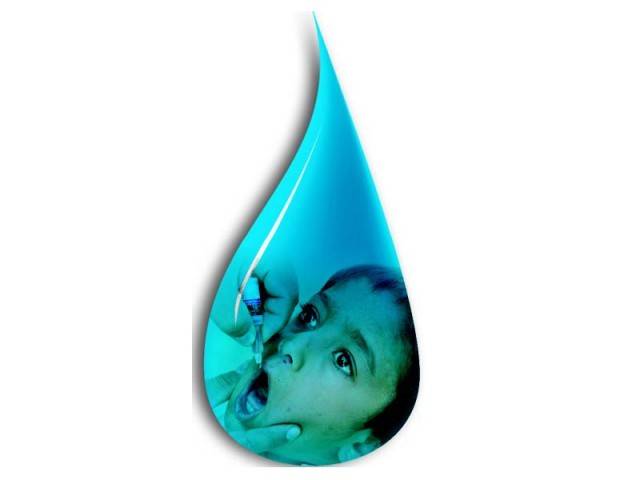ISLAMABAD - At a time when entire world’s gaze is glued on Pakistan’s progress in polio eradication, 431,377 children from different parts of the country remained unvaccinated during the Sub-National Immunisation Days (SNIDs) held in March 2012, according to the maiden edition of Polio Alert, an e-newsletter published by the World Health Organisation.
An analysis based on tabulations derived from Post-Campaign Monitoring (PCM) data shows that 208,884 children eligible for polio immunisation were missed in Punjab alone, followed closely by Khyber Pakhtunkhwa, where 204,432 children remained inaccessible to polio teams. The number of missed children in FATA stood at 12,546, with Balochistan and Islamabad being responsible for missing out 2,893 and 2,622 children, respectively. Data for Sindh is not available and has, therefore, not been included in the count.
No matter how concerted an effort, a large number of children continue to be left out of the nationwide immunisation rounds conducted each year. Many are repeatedly missed and some do not even receive a single dose of the polio vaccine, the newsletter states. These children then harbour and spread the virus to other children, including those who did receive the vaccine but did not respond to it. Newly born children, as well as those who are sick, sleeping, or aged under six months are most frequently missed. Moreover, beggars, refugees, nomads, brick kiln workers, as well as those living in hard-to-reach areas, urban slums, small rural towns or security compromised areas also tend to remain out of the immunization loop.
At a time when polio eradication in Pakistan is being pursued on an emergency footing, it is important to remember that even a single poor quality campaign, where all children are not reached with polio vaccine, can leave the virus free to circulate, leading to an increase in the number of cases. All eligible children under the age of five need to be vaccinated with polio drops in each and every campaign till such time that polio is completely eradicated from the country, states Polio Alert.
The e-newsletter offers an interesting blend of perspectives on polio from the national and international media. The viewpoint of a mother in her role as one of the most important stakeholders in the fight against polio makes interesting reading. In a section titled ‘Quote, Unquote,’ Shabana Qureshi, a mother of three has expressed her apprehensions about the quality of polio vaccine being administered to children in Pakistan.
Having lived a better part of her married life in the United States, Shabana shares that in the US, it is mandatory for parents to get their children immunized against all childhood diseases. “At the time of admission, schools ask parents to produce their child’s immunization card, and children who have missed their shots are denied admission unless they are fully protected,” she adds.
The mother has expressed concern about the immunisation status of her youngest son, Ziad. “Ever since my return to Pakistan, I have persistently been hearing rumours about polio vaccine on the media. So much so, that I do not trust the vaccine any more. We have had polio teams visiting our house in DHA, Islamabad, but I have never entertained them because I think the vaccine is not safe,” points out Shabana, who is an educated and enlightened lady who fully recognises the value of immunisation but would rather waits till end-May 2012 and have her child immunised in the US during summer vacations.
The e-newsletter offers a biography of polio in Pakistan, as well as a national and global case count. In a section titled ‘Personal Narrative,’ one gets to read the true story of a polio victim, Kamran Khan, as he struggles through life. Even though too late, the regret now pricking the conscience of the boy’s parents, who failed in their duty to have him immunized against polio, will be there to stay for life.
The newsletter also contains projections with respect to Pakistan’s chances of eradicating polio. “Even though Pakistan has yet to experience its peak season for poliovirus transmission, current trends indicate that the country will close the year with substantially fewer polio cases than 2011, when 198 were recorded,” it states.
Pakistan accounts for more than 40 per cent of all global polio cases so far in 2012. A total of 15 cases have been recorded as of early April, with the bulk found in high-risk areas such as the Federally Administered Tribal Areas (FATA) and Khyber Pakhtunkhwa (KPK). The bulk of cases (77%) in 2011 were among under-served populations, in particular Pashtoon-speaking families. Resources and assistance are being prioritised to identify high-risk areas.
Friday, April 19, 2024
431,377 kids remain unvaccinated during SNIDs

Ch Shafay visits Directorate of Consumer Protection Council
April 19, 2024
Faizabad commission report leaked, it should be made public now, suggests Abbasi
11:11 AM | April 19, 2024
MPCL makes new gas discovery in Sindh’s Marighazj formation
April 19, 2024
A Tense Neighbourhood
April 19, 2024
Dubai Underwater
April 19, 2024
X Debate Continues
April 19, 2024
Hepatitis Challenge
April 18, 2024
IMF Predictions
April 18, 2024
Kite tragedy
April 19, 2024
Discipline dilemma
April 19, 2024
Urgent plea
April 19, 2024
Justice denied
April 18, 2024
AI dilemmas unveiled
April 18, 2024
ePaper - Nawaiwaqt
Advertisement
Nawaiwaqt Group | Copyright © 2024





